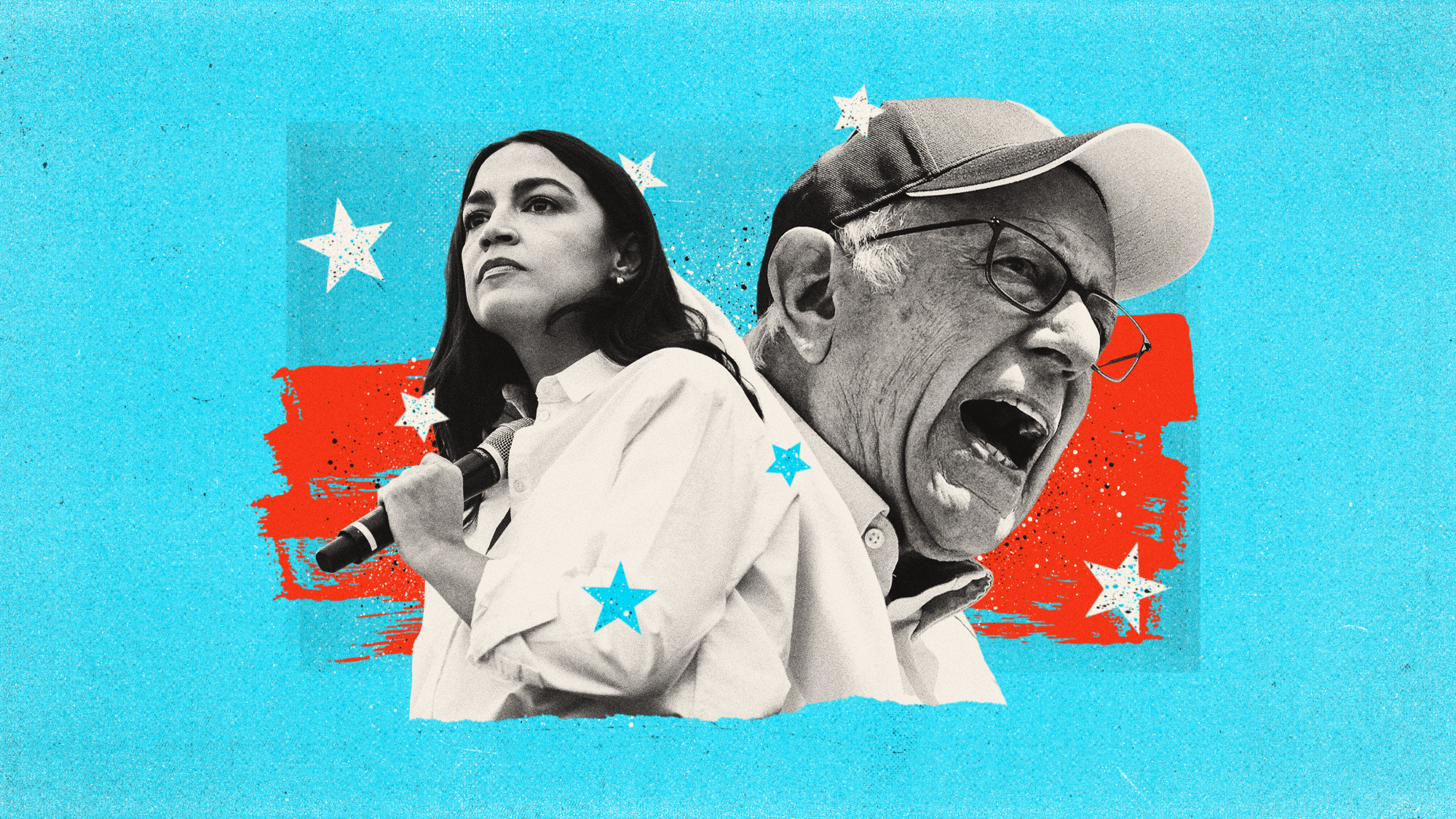Bernie Sanders is picking the wrong fight with Amazon
Fighting Amazon is smart. Pretending it's on welfare is dumb.


A free daily email with the biggest news stories of the day – and the best features from TheWeek.com
You are now subscribed
Your newsletter sign-up was successful
Bernie Sanders has been picking fights with Amazon and its CEO Jeff Bezos for months now, attacking the company's poor working conditions, the immense discrepancy between Bezos' wealth (he is the richest person on Earth) and his company's low wages, and so on. It is a battle eminently worth having.
But lately Sanders has pursued an unfortunate line of attack. Noting that some fraction of Amazon employees are on food stamps, Medicaid, or other public benefits, he argues that Amazon itself is "corporate welfare," and thus its wages should be increased so as those benefits are no longer needed. He is proposing a bill to tax companies like Amazon one dollar for every dollar of public benefits their employees receive.
The idea is to force those companies to increase their pay, which is an excellent goal. But this is a bad justifying argument that directly undermines the sort of social-democratic welfare state that Sanders wants to build.
The Week
Escape your echo chamber. Get the facts behind the news, plus analysis from multiple perspectives.

Sign up for The Week's Free Newsletters
From our morning news briefing to a weekly Good News Newsletter, get the best of The Week delivered directly to your inbox.
From our morning news briefing to a weekly Good News Newsletter, get the best of The Week delivered directly to your inbox.
Now, it is of course true that a great many Amazon employees — above all their warehouse workers — are badly underpaid and overworked. Those employees deserve a huge wage increase and, perhaps more importantly, much greater control over their often nightmarish working conditions. A proper 40-hour week with eight-hour days, regularly scheduled shifts and breaks, climate control, an end to panopticon Taylorist surveillance, and similar measures would help those workers probably even more than increased wages.
But as an initial descriptive matter, the only way that Amazon can be described as receiving food stamp subsidies is if they allow the company to pay lower wages than it would otherwise be able to do. That might be the case sometimes, as its median pay is $28,446 — but that includes workers in 50 other countries. Independent salary websites report that U.S. warehouse workers are paid about $13 per hour, well above the minimum wage and about what Walmart pays its entry-level employees. Amazon claims its median U.S. pay is $34,123, and that any workers who qualified for food stamps did so because they only worked part time.
Again, those wages aren't great and should be increased (incidentally, "more steady full-time work" would probably be towards the top of any Amazon union demands). But some 1.8 million workers (or 2.7 percent of the total) were making the federal minimum wage of $7.25 or less in 2017 — considerably less than $13 per hour. It seems pretty unlikely that Amazon is capturing much of anything from food stamps or other benefits by being allowed to pay lower wages.
And if that is true, then those benefits went to the workers, not the company.
A free daily email with the biggest news stories of the day – and the best features from TheWeek.com
That leads to my main point about the anti-corporate welfare logic here. If the U.S. passed Sanders' Medicare-for-all bill, or his proposed government program for 12 weeks of paid parental leave for all workers, naturally all Amazon employees would be enrolled in the program. By this logic, that would put Amazon drastically more "on welfare" than it is today.
But that's an absurd conclusion. The purpose of good welfare state programs is to provide universal benefits to the whole population. The only worries corporations raise in such a system is making sure the bottom of the wage scale stays high enough to avoid the capture scenario above, and that they're paying a fair share of the taxes needed to finance the scheme.
More broadly, the logic of pushing employers to make sure their workers are paid enough to not need public benefits leads to the corporatist-style welfare state, in which job benefits are the main vector through which people receive things like health insurance. That's a system we have already and it is absolute garbage — even Germany's version is far inferior to the Nordic social democracies that Sanders rightly references as splendid success stories.
Now, I understand what Sanders is driving at. Amazon workers are underpaid. And it is important to note that Amazon has been directly subsidized in terms of receiving a public benefit relative to other corporations. For years and years it paid no sales taxes at all, thus receiving a large and absolutely unfair leg up relative to other retailers, which it used to cement its monopolistic dominance of the online market. It still pays far less than it should. Its abuse of its dominant sales platform also raises enormous anti-trust questions, as Lina Khan writes.
But the way to wage class war on Jeff Bezos is with broad taxes, unions, and regulations, not schemes to punish him for his employees being on public programs.
Ryan Cooper is a national correspondent at TheWeek.com. His work has appeared in the Washington Monthly, The New Republic, and the Washington Post.
-
 Wuthering Heights: ‘wildly fun’ reinvention of the classic novel lacks depth
Wuthering Heights: ‘wildly fun’ reinvention of the classic novel lacks depthTalking Point Emerald Fennell splits the critics with her sizzling spin on Emily Brontë’s gothic tale
-
 Why the Bangladesh election is one to watch
Why the Bangladesh election is one to watchThe Explainer Opposition party has claimed the void left by Sheikh Hasina’s Awami League but Islamist party could yet have a say
-
 The world’s most romantic hotels
The world’s most romantic hotelsThe Week Recommends Treetop hideaways, secluded villas and a woodland cabin – perfect settings for Valentine’s Day
-
 The billionaires’ wealth tax: a catastrophe for California?
The billionaires’ wealth tax: a catastrophe for California?Talking Point Peter Thiel and Larry Page preparing to change state residency
-
 Mamdani vows big changes as New York’s new mayor
Mamdani vows big changes as New York’s new mayorSpeed Read
-
 Bari Weiss’ ‘60 Minutes’ scandal is about more than one report
Bari Weiss’ ‘60 Minutes’ scandal is about more than one reportIN THE SPOTLIGHT By blocking an approved segment on a controversial prison holding US deportees in El Salvador, the editor-in-chief of CBS News has become the main story
-
 Has Zohran Mamdani shown the Democrats how to win again?
Has Zohran Mamdani shown the Democrats how to win again?Today’s Big Question New York City mayoral election touted as victory for left-wing populists but moderate centrist wins elsewhere present more complex path for Democratic Party
-
 Millions turn out for anti-Trump ‘No Kings’ rallies
Millions turn out for anti-Trump ‘No Kings’ ralliesSpeed Read An estimated 7 million people participated, 2 million more than at the first ‘No Kings’ protest in June
-
 Ghislaine Maxwell: angling for a Trump pardon
Ghislaine Maxwell: angling for a Trump pardonTalking Point Convicted sex trafficker's testimony could shed new light on president's links to Jeffrey Epstein
-
 The last words and final moments of 40 presidents
The last words and final moments of 40 presidentsThe Explainer Some are eloquent quotes worthy of the holders of the highest office in the nation, and others... aren't
-
 The anger fueling the Bernie Sanders and Alexandria Ocasio-Cortez barnstorming tour
The anger fueling the Bernie Sanders and Alexandria Ocasio-Cortez barnstorming tourTalking Points The duo is drawing big anti-Trump crowds in red states
